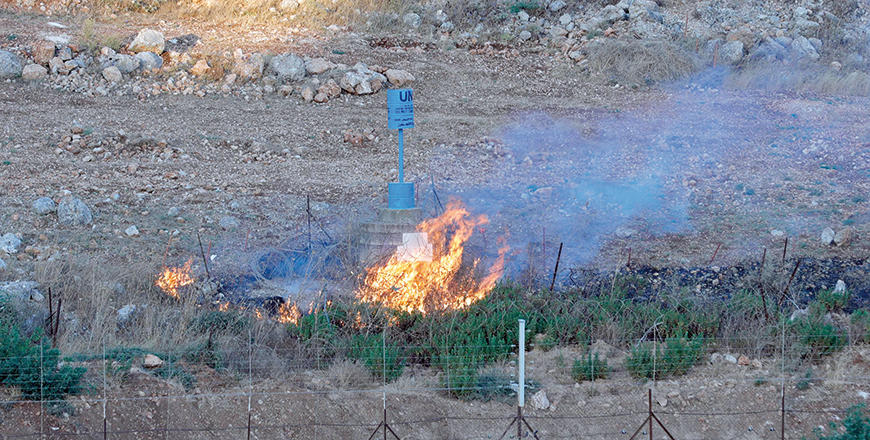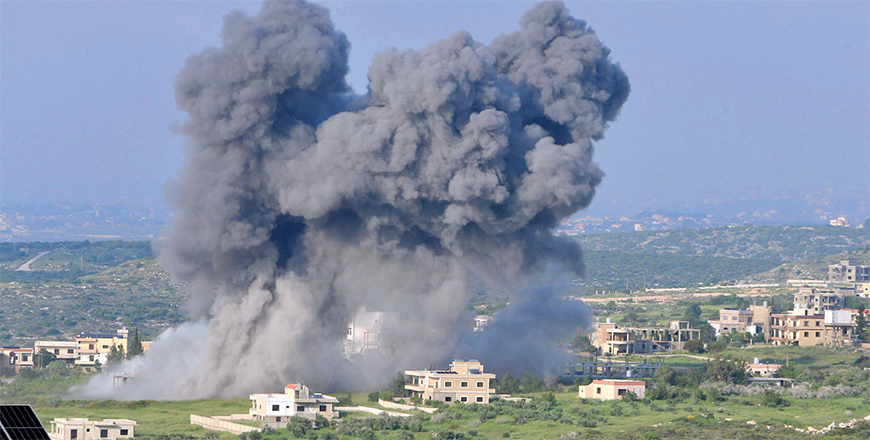You are here
Lebanese army says Israel fired 40 rockets into south Lebanon
By AFP - Sep 01,2019 - Last updated at Sep 01,2019

This photo taken on Sunday from a location near the southern Lebanese town of Maroun Al Ras, close to the border with Israel, shows smoke rising from fires along the border with Israel on the Lebanese side following an exchange of fire (AFP photo)
KIRYAT SHMONA — The Lebanese army said Israel fired 40 rockets into southern Lebanon on Sunday after the Hizbollah movement claimed it destroyed an Israeli military vehicle across the border.
"The Israeli occupation forces targeted areas outside Maroun Al Ras, Aitaroun and Yaroun with more than 40 cluster and incendiary rockets," the army said in a statement.
Hizbollah said it destroyed an Israeli military vehicle and killed and wounded those inside, but Israel had not commented in detail.
Lebanon's Prime Minister Saad Hariri urged the United States and France to intervene, contacting US Secretary of State Mike Pompeo and French President Emmanuel Macron's diplomatic adviser to do so.
The head of the UN peacekeeping force in Lebanon urged "maximum restraint".
Israel's army said in a statement that "a number of anti-tank missiles were fired from Lebanon towards an [Israeli military] base and military vehicles".
"A number of hits have been confirmed," it said.
It was "responding with fire towards the sources of fire and targets in southern Lebanon".
The Lebanese army said Israel fired 40 rockets into the south of the country.
Hizbollah said in a statement its fighters "destroyed a military vehicle on the road to the Avivim barracks [in northern Israel], killing and wounding those inside".
After the initial reports of fire from Lebanon, an Israeli military spokesman called on Israelis living within four kilometres of the Lebanese border to remain at home and prepare shelters.
Tensions have risen in the last week between Israel and its enemy Hizbollah, the Lebanese Shiite movement backed by Iran.
Hizbollah chief Sayyed Hassan Nasrallah said Saturday the group's response to an alleged Israeli drone attack on the group's Beirut stronghold had been "decided".
The pre-dawn August 25 attack involved two drones — one exploded and caused damage to a Hizbollah-run media centre and another crashed without detonating due to technical failure.
Israel has not claimed responsibility for the incident.
The attack in Lebanon came just hours after Israel launched strikes in neighbouring Syria to prevent what it claimed was an impending Iranian drone attack on Israel.
‘Calm down’
Israel has carried out hundreds of strikes in Syria since the civil war began there in 2011 against what it says are Iranian and Hizbollah sites.
It has pledged to prevent its main enemy Iran from entrenching itself militarily in neighbouring Syria.
Iran and Hizbollah, along with Russia, have backed Syrian President Bashar Assad in his country’s civil war.
But a drone attack by Israel inside Lebanon would mark a departure — what Nasrallah had called the first such “hostile action” since a 2006 war between them.
On Thursday, Israel accused Iran of collaborating with Hizbollah to build precision-guided missiles in Lebanon.
British paper The Times reported last week that the suspected Israeli drone attack targeted crates believed to contain machinery to mix high-grade propellant for precision missiles.
Sunday’s escalation comes just ahead of Israel’s September 17 election.
Israeli Prime Minister Benjamin Netanyahu is seen as wanting to avoid a major conflict before then due to the political risk involved, but he has also warned Lebanon and Hizbollah to “be careful”.
Addressing Nasrallah, Netanyahu told a conference in occupied Jerusalem on Tuesday that “he knows very well that Israel knows how to defend itself well, and to repay its enemies”.
He suggested that Nasrallah “calm down”.
But while Nasrallah has issued warnings to Israel, Hizbollah’s number two Naim Qassem in an interview with Russia Today last week played down talk of a “war atmosphere”.
“The atmosphere is an atmosphere of response to an aggression,” he said.
A 2006 war between Israel and Hizbollah took the lives of 1,200 Lebanese, mostly civilians, and more than 160 Israelis, mostly soldiers.
Related Articles
BEIRUT — Israeli forces fire wounded three members of Lebanon's Iran-backed Hizbollah movement on Wednesday near the border with Israel, a s
BEIRUT — An Israeli strike in south Lebanon killed a Hizbollah fighter, the group said Wednesday, as state media reported two of his relativ
BEIRUT — Lebanon's Iran-backed Hizbollah group said it launched a drone and missile attack on an Israeli base on Wednesday in response to st


















